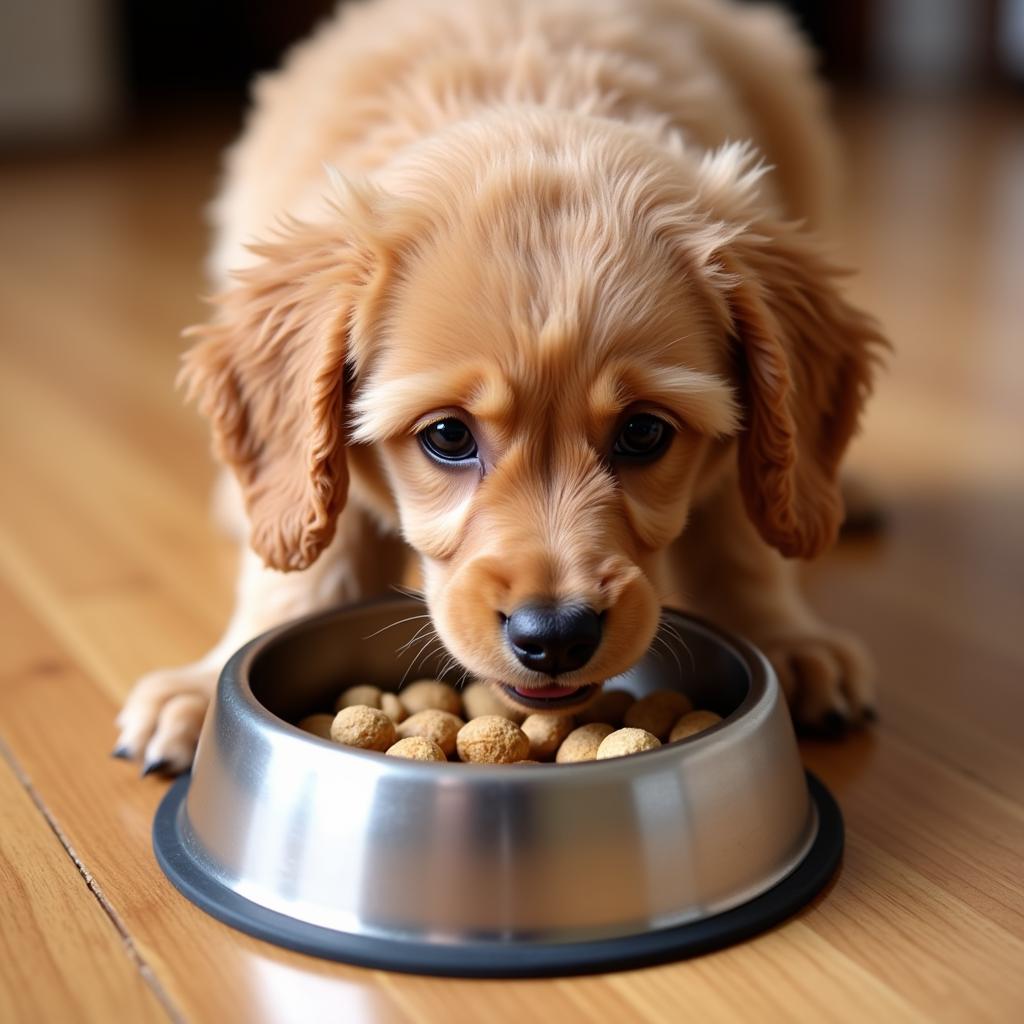Finding the best puppy food for your toy poodle can feel overwhelming. With so many options available, how do you choose the right one to ensure your tiny companion thrives? This guide will explore everything you need to know about selecting the perfect puppy food for your toy poodle, from nutritional needs to common ingredients and potential allergies.
Nutritional Needs of Toy Poodle Puppies
 Toy Poodle puppy enjoying a healthy meal
Toy Poodle puppy enjoying a healthy meal
Toy poodles, despite their small stature, have specific nutritional requirements, especially during puppyhood. They need a diet rich in protein for muscle development, healthy fats for energy and coat health, and carbohydrates for sustained energy levels. Look for puppy food formulated for small breeds, as these typically have smaller kibble sizes easier for their tiny mouths to manage and a higher calorie density to meet their energetic needs. These formulas also often include DHA, an omega-3 fatty acid crucial for brain development.
Decoding Puppy Food Labels: What to Look For
Understanding puppy food labels is key to making informed decisions. The first ingredient should always be a named meat source, such as chicken, lamb, or fish. Avoid foods with vague terms like “meat by-products.” Look for foods that specify the type of meat used, for example, “chicken meal” rather than just “poultry meal.” best dry dog food for poodles can be a great option for toy poodles, provided it’s specifically formulated for puppies.
What are Essential Nutrients for Toy Poodle Puppies?
Essential nutrients for toy poodle puppies include protein, fats, carbohydrates, vitamins, and minerals. Calcium and phosphorus are particularly important for healthy bone development in these small breeds. Avoid foods with artificial colors, flavors, and preservatives.
Why is Protein Important? Protein is the building block of muscles and is essential for growth and repair.
- How much protein does a toy poodle puppy need? Puppy food should contain at least 22% protein for optimal growth.
Common Ingredients in Puppy Food
Puppy food often contains a blend of meat, grains, fruits, and vegetables. While grains can provide essential nutrients, some puppies may be sensitive to them. If you suspect your puppy has a grain allergy, consider grain-free options. poodle dog good food articles can provide further guidance on choosing the right ingredients.
Are Grain-Free Diets Necessary for Toy Poodles?
Not all toy poodles require grain-free diets. However, if your puppy experiences digestive upset, skin issues, or other allergy symptoms after eating food containing grains, a grain-free diet may be beneficial. healthy food for toy poodles provides further insights into dietary considerations.
Potential Food Allergies in Toy Poodles
Toy poodles, like other breeds, can develop food allergies. Common allergens include beef, chicken, dairy, and wheat.
How to Identify a Food Allergy?
Symptoms of food allergies in puppies can include itching, skin rashes, ear infections, vomiting, and diarrhea. If you suspect your puppy has a food allergy, consult with your veterinarian. They can help diagnose the allergy and recommend an appropriate diet. beef based dog food may not be suitable for poodles with beef allergies.
“Identifying and addressing food allergies early can significantly improve a toy poodle’s quality of life,” says Dr. Emily Carter, DVM.
Feeding Schedule and Portion Control for Toy Poodle Puppies
Toy poodle puppies have small stomachs and need to eat frequent, small meals throughout the day. Start by feeding your puppy three to four times a day and gradually reduce the frequency as they grow older. Always follow the feeding guidelines on the puppy food packaging and adjust portions based on your puppy’s individual needs. Overfeeding can lead to obesity, while underfeeding can hinder growth and development.
“Maintaining a consistent feeding schedule and appropriate portion sizes is crucial for a toy poodle puppy’s overall health and well-being,” advises Dr. Sarah Miller, a canine nutritionist.
Conclusion
Choosing the best puppy food for your toy poodle is a vital step in ensuring their long-term health and happiness. By understanding their nutritional needs, reading food labels carefully, and monitoring for potential allergies, you can provide your furry friend with the foundation they need to thrive. Remember to consult with your veterinarian for personalized dietary advice. Finding the Best Puppy Food For Toy Poodles ensures a healthy start to their life.
FAQ
- What is the best type of food for a toy poodle puppy? High-quality puppy food formulated for small breeds is ideal.
- How often should I feed my toy poodle puppy? Three to four times a day for young puppies, reducing to twice a day as they grow.
- Can I give my toy poodle puppy human food? Some human foods are safe for dogs, but always consult with your vet before offering anything new.
- What are the signs of a food allergy in a toy poodle? Itching, skin rashes, ear infections, vomiting, and diarrhea can be signs of food allergies.
- How much food should I give my toy poodle puppy? Follow the guidelines on the food packaging and adjust based on your puppy’s individual needs.
- What are some good brands of puppy food for toy poodles? Consult your veterinarian for recommendations based on your puppy’s specific needs.
- When should I switch my toy poodle puppy to adult food? Generally, around 10-12 months of age, but consult with your vet for personalized advice.
Common Situations and Questions
- My puppy has a sensitive stomach. What should I do? Consider a limited ingredient diet or a food formulated for sensitive stomachs.
- My puppy won’t eat their food. What can I try? Try warming the food slightly or adding a small amount of low-sodium chicken broth.
- How do I transition my puppy to a new food? Gradually mix the new food with the old food over several days.
Further Reading
Contact Us
Need assistance with your toy poodle’s diet? Contact us! Phone: 02437655121, Email: minacones@gmail.com or visit us at 3PGH+8R9, ĐT70A, thôn Trung, Bắc Từ Liêm, Hà Nội, Việt Nam. We have a 24/7 customer support team.